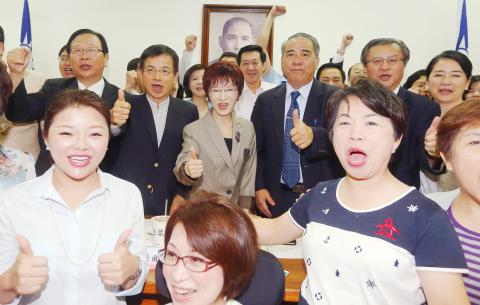Deputy Legislative Speaker Hung Hsiu-chu (洪秀柱), the only contender in the Chinese Nationalist Party’s (KMT) presidential primary, yesterday vowed to lead the party in the fight to secure a majority in the legislature in January’s elections.
While doubts continue to cast a pall on the KMT presidential primary amid rumors that many of the party’s lawmakers are hesitant about endorsing her bid, about 40 legislators attended a party caucus meeting yesterday and cheered for the deputy speaker.
Hung told the caucus meeting, which was open to the media, that she was there not to present her policy, but to share her thoughts about her decision to run for president.

Photo: CNA
“I stand with [the party]. I know that many are afraid that I, as the mother hen, would not only fail to lead the chicks, but might even trample them,” Hung said in response to critics, who say that her winning the candidacy would make the party’s legislative election prospects, especially in the south, bleak. “But I have to tell you that I am not only a mother hen, I am also a hen that can fly.”
Hung said she would lead the party in facing the headwinds and help it secure a majority in the legislature. She added that she would not receive funding from the party, which she expects would be used for the party’s legislative candidates.
Small donations from supporters will be the source of her election campaign funding, Hung said, vowing to break the myth that “lavish spending on election campaigns” is the only way to win.
Hung underscored the importance of institutions and “what has been put down in black and white,” intimating that the party should adhere to the set primary rules on how a popularity poll, required for presidential primary contenders, should be done.
“I have reiterated that we should not agree to any other type [of public poll] other than the one that solely measures support for the contender as stipulated in the primary rules [rather than pitting her against the opposition candidate]. However, if the party decides to do it that way, [I] would not withdraw from the competition either,” Hung said.
KMT headquarters had announced earlier that two public polls would be conducted, with one pitting the KMT contender against the opposition candidate accounting for 85 percent, and another that solely measures the KMT candidate’s popularity accounting for the other 15 percent.
It announced yesterday that the ratio would now be 50/50, which is seen to be a more encouraging sign for Hung.

Taiwanese can file complaints with the Tourism Administration to report travel agencies if their activities caused termination of a person’s citizenship, Mainland Affairs Council Minister Chiu Chui-cheng (邱垂正) said yesterday, after a podcaster highlighted a case in which a person’s citizenship was canceled for receiving a single-use Chinese passport to enter Russia. The council is aware of incidents in which people who signed up through Chinese travel agencies for tours of Russia were told they could obtain Russian visas and fast-track border clearance, Chiu told reporters on the sidelines of an event in Taipei. However, the travel agencies actually applied

Japanese footwear brand Onitsuka Tiger today issued a public apology and said it has suspended an employee amid allegations that the staff member discriminated against a Vietnamese customer at its Taipei 101 store. Posting on the social media platform Threads yesterday, a user said that an employee at the store said that “those shoes are very expensive” when her friend, who is a migrant worker from Vietnam, asked for assistance. The employee then ignored her until she asked again, to which she replied: "We don't have a size 37." The post had amassed nearly 26,000 likes and 916 comments as of this

New measures aimed at making Taiwan more attractive to foreign professionals came into effect this month, the National Development Council said yesterday. Among the changes, international students at Taiwanese universities would be able to work in Taiwan without a work permit in the two years after they graduate, explainer materials provided by the council said. In addition, foreign nationals who graduated from one of the world’s top 200 universities within the past five years can also apply for a two-year open work permit. Previously, those graduates would have needed to apply for a work permit using point-based criteria or have a Taiwanese company

The Shilin District Prosecutors’ Office yesterday indicted two Taiwanese and issued a wanted notice for Pete Liu (劉作虎), founder of Shenzhen-based smartphone manufacturer OnePlus Technology Co (萬普拉斯科技), for allegedly contravening the Act Governing Relations Between the People of the Taiwan Area and the Mainland Area (臺灣地區與大陸地區人民關係條例) by poaching 70 engineers in Taiwan. Liu allegedly traveled to Taiwan at the end of 2014 and met with a Taiwanese man surnamed Lin (林) to discuss establishing a mobile software research and development (R&D) team in Taiwan, prosecutors said. Without approval from the government, Lin, following Liu’s instructions, recruited more than 70 software